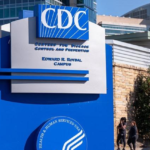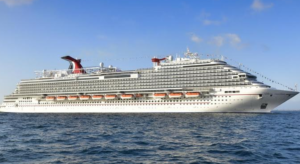 Aaron Saunders of Cruise Critic over in the USA says last week has been a confusing week in the ongoing saga between the U.S. Centers for Disease Control and Prevention (CDC) and cruise lines hoping to resume operations in North America.
Aaron Saunders of Cruise Critic over in the USA says last week has been a confusing week in the ongoing saga between the U.S. Centers for Disease Control and Prevention (CDC) and cruise lines hoping to resume operations in North America.
First, CDC Director Rochelle Walensky said that in a Senate hearing last week that her agency wasn’t the sole actor holding things back. She suggested that the Department of Transportation and other agencies were also part of the decision making.
That was news to the cruise lines, who have been waiting for direction from the agency, under its Conditional Framework for Sailing order for the past six months.
With no movement coming, the Cruise Lines International Association (CLIA) called on the CDC to drop the order and allow a phased resumption of cruising from U.S. ports by the beginning of July.
Kelly Craighead, CLIA’s USA based President and CEO said, “The lack of any action by the CDC has effectively banned all sailings in the largest cruise market in the world”, adding, Cruising is the only sector of the U.S. economy that remains prohibited, even as most others have opened or continued to operate throughout the pandemic”, adding, “The outdated CSO, which was issued almost five months ago, does not reflect the industry’s proven advancements and success operating in other parts of the world, nor the advent of vaccines, and unfairly treats cruises differently.”
In response, Cruise Critic says the agency simply reiterated its former position that the order “Remains in effect until Nov. 1, 2021, with returning to passenger cruising is a phased approach to mitigate the risk of spreading Covid-19”, the agency adding, “Details for the next phase of the CSO are currently under interagency review”, the agency failing to mention it can drop it at any time.
Cruise Critic asks the question, “Who’s In Charge?” saying that the issue of who is actually making the decision is a sticky one, adding that for months, the industry and interested parties have been under the impression that the CDC was the main actor, with all outside lobbying, such as a recent letter issued by the Mayor of Miami imploring the agency to allow cruising to resume, has focused on the health and safety agency.
But, that became fuzzy during the Senate hearings last week, with the question placed by Senator Lisa Murkowski, who represents Alaska, one of the states hardest hit by the ban, with the senator repeatedly asking CDC Director Rochelle Walensky to provide an adequate timeline for the resumption of cruise. “When you say, ‘later’, does that mean at the end of 2021?” asked Murkowski. “Does that mean in three months? Does it mean in one month?”
Walensky’s reply was “We have provided technical assistance on the Conditional Sail,” adding, “We have provided a four-phase strategy for how we could open sail. We are in phase one of that, moving toward phase two.”
Cruse Critic says that the bombshell came when Walensky said that the decision was not up to the CDC alone, that others were involved, saying, “This is an inter-agency decision,” adding, “This is not a decision solely up to the CDC, and “ There are numerous others who are making these decisions.”
She went on to say that she believed the power rested partially with the Department of Transportation, but the DOT denies its involvement and in a statement, the department told Cruise Critic the following: “The Department of Transportation does not regulate the cruise industry. Consumer complaints can be reported to the Federal Maritime Commission. Questions about vessel safety should be addressed to the U.S. Coast Guard, and crimes on cruise vessels in international waters are investigated by the FBI. “
Cruise Critic goes on to say that ships can move and that’s exactly what is happening, as the lines are faced with resistance in the United States, with an increasing number of lines have given up — at least for now — on sailing from the United States.
In recent weeks, Crystal Cruises, Celebrity, and Royal Caribbean have all announced voyages from new homeports in the Americas, with Bahamas, Bermuda and St. Maarten becoming turnaround ports rather than merely ports of call. More Caribbean ports could come shortly.
Europe is also proving to be friendlier to cruise ships than the United States, despite a less successful vaccine rollout, with Celebrity debuting its newest ship, Celebrity Apex, in Greece, in July.
Royal Caribbean is homeporting a ship in Cyprus for the first time, with sailings that visit the Greek isles; the season runs July through October. Unlike Royal’s ship Odyssey of the Seas, which will start sailing from Israel in May, these sailings are open to vaccinated passengers from around the world.
These lines that are familiar to North American cruisers join other European-based lines such as AIDA, Celestyal Cruises, Costa and MSC, which have either restarted voyages from Mediterranean ports of call, or will in the coming months.
The UK, too, is allowing numerous cruise operators to resume voyages there for domestic passengers only, including Viking.
Sailings have restarted, to a small degree, in Australia and the Galapagos Islands, under the guidance and blessings of their governments and local health authorities. Royal Caribbean has also restarted in Singapore.
At this point, the U.S. stands apart in having made little to no effort to restart cruise – even though the vaccine rollout is going well.
While a handful of domestic small ship lines, including American Cruise Line and American Queen Steamboat Company — have resumed limited operations, that’s not enough to make up for the loss of tourism jobs and revenue in U.S. homeports such as Miami, Fort Lauderdale, Seattle, Galveston and New Orleans.
Cruise Critic says that vaccines seem to be the answer, at least for some cruise lines, with Royal Caribbean chairman and CEO Richard Fain, who has established himself as one of the most visible industry leaders during this unprecedented shutdown, has suggested that the CDC’s initial guidance may be no longer relevant, thanks to the increased availability of COVID-19 vaccines within the United States, adding, “The Conditional Sailing Order was a very positive step at the time, but that time has passed”, noting that the “pace of science has simply overcome” the need for the CDC to issue additional technical guidance relating to the Framework for Conditional Sailing stating, “When the conditional sail order was written, there were no vaccines.”
Fain said, “Last October, preparing for resumption of service based on extensive protocols made good sense,” noting that out of the 100,000 passengers Royal Caribbean has carried outside of the United States, only 10 people tested positive for COVID-19.
He added, “But today, a vaccine approach makes much more sense.”
Not all lines have embraced vaccine requirements, however. MSC Cruises, as well as Viking, will continue to rely on COVID-19 testing for their round-Britain cruises and even Royal Caribbean does not have a vaccine requirement for its Singapore sailings.
The brands under Carnival Corporation have taken a split approach. While Princess and P&O Cruises are resuming cruising in Britain with a vaccine requirement, Costa and AIDA do not have one, with Seabourn President Josh Leibowitz telling Bloomberg that his line wasn’t ready to implement a vaccine requirement, as it might leave out people who can’t get it for medical reasons.
The three lines under Norwegian Cruise Line Holdings — Norwegian, Oceania and Regent Seven Seas, have not released any plans, yet, to resume cruising.
Cruise Critic says that despite silence from the CDC, CLIA executives remain “very hopeful” that cruising can resume from the U.S. in July, with at a TT organized seminar in the U.K. on March 25, CLIA Senior Vice-President for Maritime Policy Brian Salerno said that the rapid vaccine rollout, combined with the willingness of some member lines to implement vaccine requirements, sent a “strong signal that things will change this summer.”
At the seminar, Salerno admitted that the CDC has not been forthcoming, adding that CLIA has “started a new push to break that logjam,” adding, “We’re really kind of stuck,” and “We do have a lot of engagement with the government and the new administration, but CDC is the decider on this but we’re still waiting for that breakthrough.”
Meanwhile back in Australia, as the cruse sector slips even further behind, the silence from the Federal Government and even the CLIA and the major cruise companies, who we understand have been very hard at work, is absolutely deafening and while there may be a great deal of activity going on in the background and in Canberra, it is time that clear updates and timelines were provided.
In the meantime disastrous, uninformed and uneducated at least about cruising decisions such as the by the Northern Territory Government this last week continue to demonstrate at least that territory government’s ignorance of what cruising is all about and how it operates.
An edited report from Cruise Critic with commentary by John Alwyn-Jones














